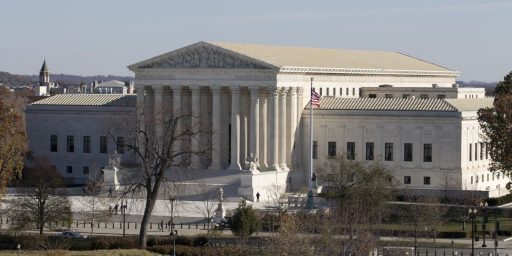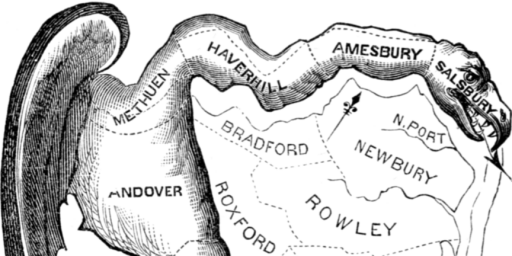Judge Rules Against Ohio Polling Place Challenges
Judge Rules Against Ohio Polling Place Challenges (The Omaha Channel)
A federal court judge has ruled that partisan challengers at Ohio polling locations is unconstitutional. The judge was asked to stop more than 3,000 Republicans who are planning to monitor polling places and challenge voters. U.S. District Judge Susan Dlott found that the presence of challengers inexperienced in the electoral process would impede voting. Meanwhile, a lawyer for the Ohio Republican Party said the GOP will appeal a judge’s ruling barring observers from all Ohio polling places. Attorney Mark Weaver said the party plans to file an appeal with the Sixth U.S. Circuit Court of Appeals in Cincinnati within the next few hours.
Dlott ruled that application of Ohio’s statute allowing challengers at polling places is unconstitutional. Dlott ruled on a lawsuit by a black Cincinnati couple who said Republican plans to deploy challengers to largely black precincts in Hamilton County was meant to intimidate and block black voters. Two civil rights activists asked Dlott to issue an emergency restraining order barring partisan challengers from polling stations in all 88 Ohio counties. The attorneys said the Republican challengers intend to intimidate newly registered black voters. Ohio Secretary of State Kenneth Blackwell issued a statement saying those challengers could disrupt the voting. Ohio law allows people to challenge a voter to prove they are eligible. Ohio’s Assistant Attorney General Rick Coglianese argued that the law is not aimed at black voters and does not violate their civil rights.
Judge Dlott worked through the night drafting her decision. She is the same judge who stopped boards of elections statewide from conducting Republican Party initiated voter eligibility hearings.
This ruling strikes me as odd. Indeed, every time I’ve voted, there have been election observers from the two political parties. There’s no better way that I can think of to assure people that there is no misconduct taking place in heavily partisan precincts. That said, I could see where having hordes of challengers could disrupt the process.
This is yet another case, though, where the legislature is a more legitimate body to make decisions on such issues than the courts. The advantage of having the legislature make these choices–as they had already done by passing the statute, signed by the governor–is that they are made a priori. When judges get involved, by definition, a specific case in controversy exists and there is therefore knowledge of which party a specific application of a rule will advantage. In this case, a single political appointee has made two crucial judgments that may call the most heated state contest into question. That’s not good for a democratic system.
UPDATE (2112): Judge Reversed: Ohio Challenges Restored






I agree that the current tendency to litigate every issue is warping the democratic process. Seems to me that having a reasonable number of observers at polling places who can challenge voter qualifications is consistent with the need for transparency. The fact that one judge disagrees and can enforce her opinion is troubling.
I feel this is a fine example of the balance between the Legislative and the Judicial branches. The planned voter disruption intentionally targeting Black districts is racist. How long will the wait to vote be? Are we a society of inclusion or exclusion?
The legislature never envisioned a political party being so bold as to try to supress voter turnout using this tactic. Thank goodness there was a court to remediate this potential travesty. The legislature would have taken years to react.
This election ending up in court is, unfortunately, unavoidable. 2000 was the precedent, and with the help of the media it’ll happen in every election from now on. Certainly the news services wouldn’t let such a juicy story get away scot-free.
I don’t believe it has as much to do with politics as it does with creating news. Getting people stirred up enough to read the paper or watch it on TV makes for more profits.
Bill, I’ve heard this argument many times, but no one ever explains how challenging votersdisruption or supression. I’d relish being challenged tomorrow, because I’m legally registered and eligible to vote.
Someone wanting to challenge me could only serve to make want to vote all the more (although I’m well beyond the threshold where there could be any question of whether I’ll vote in any given election).
If I weren’t eligible to vote, or not legally registered, knowing that the likelihood of being challenged was high would most likely discourage me from trying to vote. People in those circumstances should feel intimidated, and, by definition, their vote isn’t being surpressed.
It’s just a political ploy to engender an angry reaction based on a falsehood.
Imagine a line that was 12 hours long. Now imagine how likely you would be to stand at the end of it.
That’s voter supression.
“The planned voter disruption intentionally targeting Black districts is racist.”
Why the continual whine from Kerry supporters that ensuring that only eligible voters actually vote is racist? What kind of damning statement is it to insist that programs that target people who break the law are anti-black? The insinuation that blacks are more heavily affected by anti-fraud measures is in itself racist and especially pathetic if it is an admission made by an African American.
Even though it was accomplished with much debate, posturing, and rancor, no reasonable citzen challenges the legitimacy of the 1965 Civil Rights and Voting Rights Acts today. However, the partisan bickering in the Senate over judical nominations is the product of one Supreme Court decision, Roe vs Wade. One was accomplished by the body of the people, the second by those who sit virtually, therfore defacto, for life unaccountable by the people.
Why are Democrats and not Republicans afraid of having their constituents challenged? The monitoring was to take place in 88 Ohio counties…Not just predominantly black counties. If it is occurring everywhere with the same standard then by definition it is not racist and would seem to be fair. We have a prop here in Arizona requiring proof of citizenship before allowing the person to vote. It will probably not pass and have to be pulled because of a court decision and a snafu by the proposition proponents. They had people sign a petition to get it on the ballot, but the wording included proof of citizenship for access to public welfare and the final copy on the ballot stated public services. Opponents correctly point out the difference in meaning…excluding “welfare” changes the meaning drastically, so it may be pulled. Maybe next year. 🙂
I wonder how many challenges the GOP plans for heavily Republican districts with median incomes over 100k?
I am willing to bet “none” would be the answer…
Every fraudelent vote that gets counted disenfranchises one voter who went the opposite way. Way dont the courts consider that?
The time it takes to verify a voter’s name and address from a photo id or voter registration card against the voter roll is less than the time to responsibly complete a voter ballot. The long waits are from not having enough voter booths (i.e. voters waiting for the other voters) not from checking ID. The election supervisors at least should perform the minimum of checking off the name on the voter roll to prevent double-voting.
AS: Well, OF COURSE Republicans are mainly going to concentrate on potential fraud that helps the Democrats. It’s up to the Democrats to look out for their own interests. As long as all that’s being done is checking ID and so forth, both parties have a responsibility to do that in order to protect their voters.
Why do Democrats like opportunities for voter fraud in America, but rail against the same opportunities in the rest of the world?
So blacks are, as a race, subject to intimidation and require protection that allows massive fraud withing the system? What sort of admission is that?
This is nothing more than throwing the race card at an otherwise longstanding and neutrally balanced provision of the law to handcuff those who would try to assure honest elections. Each side claims to have registered many new voters and each has been accused of fraud in doing so. The Democrats claim to have registered more new voters. But they claim a pass on the duty to show the legitimacy of their new voters by screaming about racism.
Last presidential election saw Democrats complain about the vote in many predominately Democratic areas and try to get the courts to change the counting. This election is likely to see far more involvement by lawyers and judges. Many people disagreed with the outcome last time. More will undoubtedly disagree this time and the whole process will fall into disrepute and ridicule.
Seriously, have we come to the point where victory itself is more important than having an election that people see is fair? That’s going to be terribly dangerous in the long run, as it is a game that both sides can play. If they do, the credibility of our democratic system will be lost.
I couldn’t agree more with the argument that playing the game within the established rules is far preferable to trying to change the rules after the outcome seems cast.
“…The planned voter disruption intentionally targeting Black districts is racist. How long will the wait to vote be? Are we a society of inclusion or exclusion…”
just wondering Bill,
if people in these districts are committing fraud, shouldnt they be stopped??? regardless of the color of the skin of the persons committing the fraud???
you call it voter disruption… I call it fraud disruption…surely you dont mean to suggest that we are a society that should allow fraud to affect the election process(even if it helps the guy you’re rooting for)… that surely would be exclusionary, wouldnt it?
also, how does providing legit ID to prove you are who you say you are intimidate or supress or disenfranchise or disrupt anyones ability to vote???
PS: Im a Democrat… and Im disgusted by the ‘win at any cost, even if we have to cheat’ mentality of my party… see the Pennsylvania prison voter registration program… sad… we fight for the right to keep military’s votes from being counted while actively signing up the prison roles…
It seems to me that voting day is the wrong time to be battling fraud; it’s too frantic and too inconvenient for the voters. All challenges should be carried out both beforehand and afterwards. All those volunteers who are so hot to challenge voters at the polls should be just as willing to plow through all the voting records after the fact to identify those who committed vote fraud. Then prosecute the perpetrators. Isn’t that a cleaner and more efficacious approach than adding to the confusion at the polls?
Chris: It is too late afterwards as has been shown repeatedly (Kennedy/ Nixon for one obvious example).
PS: Court of Appeals overturned the Federal judge on poll watchers issue, as per a news broadcast I saw two minutes ago.
I’m an Ohio Republican observer in Lorain County’s eighth ward, and I’d liveblog the day if I could do it without shortchanging my duties and inviting Democrat lawsuits. Unfortunately I can’t. If anything interesting happens, I’ll post something when I get back.
mikem: If the purpose of post-election verification is to identify and prosecute fraudulent voters, the deterrent value is entirely effective and it doesn’t have any deleterious effect on the polling process itself. Many crimes are prevented by “the paper trail” that points to the criminal. The same should work just as effectively here. Trying to stop vote fraud at the polling place is like trying to build a car that can’t be stolen: the only way to do it well is to make the car almost unusable.
Chris: You are speaking of criminal prosecution. That would be a surprising result. I am no lawyer and do not follow that issue specifically but I read a lot and cannot recall a single prosecution. My point, and I thought we were talking about the same thing, is that even a successfully argued post election charge of voter fraud can do nothing to change the result of the vote. The fraud, even if detected, is successful. Of course the reason is that voting is by secret ballot and a judge would have no way of determining who the fraudulent voter voted for. That is why voter fraud needs to be detected before the vote, not after the fraud is rewarded with victory by having the vote counted.
We don’t know who the criminal voted for, but we do know that he voted; that’s all that matters to insure a successful prosecution. And if we can guarantee a successful prosecution, then we can prevent voter fraud. Who’s willing to go to jail for a year to get their candidate elected?
I’d very much like to see aggressive prosecution off ALL forms of electoral misbehavior, including all cases of people sending out letters that deliberately mislead voters about their polling places or times of voting, letters that falsely suggest that they are not properly registered, phone calls that misdirect them, and so forth. And of course, any outright vote fraud must be prosecuted aggressively. Let’s throw all those crooks in jail!
Chris: I’ll just drop this exchange because I think you are trolling by making deliberately naive statements like ” Who’s willing to go to jail for a year to get their candidate elected?” Considering the tens of thousands of fraudulant registrations by ACT exposed in Ohio it is obvious that tens of thousnds will risk it because they will not be prosecuted and spend a year in jail. I had thought you were trying to make a point about voter fraud and how to prevent it, but you are just trying to rationalize not preventing it because ‘no one would dare’ and I will not believe you are that naive. Good troll though, I actually took you seriously.
You seem to underestimate the importance of the basic concept I argue: that the law almost always works more effectively when used as an after-the-fact deterrent rather than an on-the-spot task. Sure, a murder prosecution doesn’t bring back the dead, but we all can’t go around wearing body armor. Voter fraud is a serious crime, and we should prosecute it. If it really is happening, then the people perpetrating it should be easy to track down, as they leave a solid paper trail. Why should we chase ghosts at the polls, disrupting that process, when we can nail voter fraud after the fact? If we can’t nail it after the fact, then we certainly can’t catch it at the polls, and if we can nail it after the fact, then we can prosecute the perpetrators and send them to jail. And to be consistent, we should also prosecute the various other attempts to foil the integrity of the voting process, such as the fraudulent letters sent to some newly registered voters.